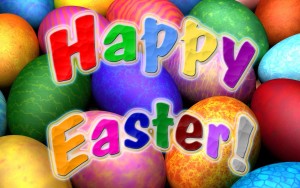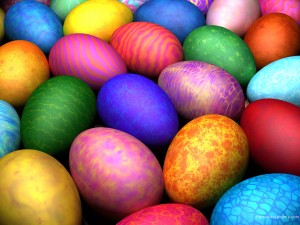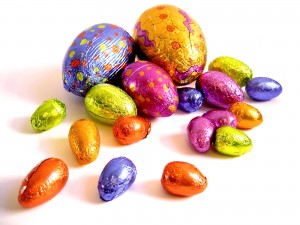 Easter (Old English usually Ēastrun, -on, or -an; also Ēastru, -o; and Ēostre), also called Pasch (derived, through Latin: Pascha and Greek Πάσχα Paskha, from Aramaic: פסחא, cognate to Hebrew: פֶּסַח Pesaḥ) or Resurrection Sunday, is a festival and holiday celebrating the resurrection of Jesus Christ from the dead, described in the New Testament as having occurred on the third day of his burial after his crucifixion by Romans at Calvary c. 30 AD. It is the culmination of the Passion of Christ, preceded by Lent (or Great Lent), a forty-day period of fasting, prayer, and penance.
Easter (Old English usually Ēastrun, -on, or -an; also Ēastru, -o; and Ēostre), also called Pasch (derived, through Latin: Pascha and Greek Πάσχα Paskha, from Aramaic: פסחא, cognate to Hebrew: פֶּסַח Pesaḥ) or Resurrection Sunday, is a festival and holiday celebrating the resurrection of Jesus Christ from the dead, described in the New Testament as having occurred on the third day of his burial after his crucifixion by Romans at Calvary c. 30 AD. It is the culmination of the Passion of Christ, preceded by Lent (or Great Lent), a forty-day period of fasting, prayer, and penance.
The week before Easter is called Holy Week, and it contains the days of the Easter Triduum, including Maundy Thursday, commemorating the Maundy and Last Supper, as well as Good Friday, commemorating the crucifixion and death of Jesus. In western Christianity, Eastertide, the Easter Season, begins on Easter Sunday and lasts seven weeks, ending with the coming of the fiftieth day, Pentecost Sunday. In Orthodoxy, the season of Pascha begins on Pascha and ends with the coming of the fortieth day, the Feast of the Ascension.
Easter and the holidays that are related to it are moveable feasts in that they do not fall on a fixed date in the Gregorian or Julian calendars which follow the only cycle of the sun; rather, its date is determined on a lunisolar calendar similar to the Hebrew calendar. The First Council of Nicaea (325) established two rules, independence of the Jewish calendar and worldwide uniformity, which were the only rules for Easter explicitly laid down by the council. No details for the computation were specified; these were worked out in practice, a process that took centuries and generated a number of controversies. It has come to be the first Sunday after the full moon that occurs on or soonest after 21 March, but calculations vary in East and West. Details of this complicated computation are found below in the section Date.
Easter is linked to the Jewish Passover by much of its symbolism, as well as by its position in the calendar. In many languages, the words for “Easter” and “Passover” are identical or very similar. Easter customs vary across the Christian world, and include sunrise services, exclaiming the Paschal greeting, clipping the church, and decorating Easter eggs, a symbol of the empty tomb. The Easter lily, a symbol of the resurrection, traditionally decorates the chancel area of churches on this day and for the rest of Eastertide. Additional customs that have become associated with Easter and are observed by both Christians and some non-Christians include egg hunting, the Easter Bunny, and Easter parades. There are also various traditional Easter foods that vary regionally.
Etymology:
The modern English term Easter, cognate with modern German Ostern, developed from an Old English word that usually appears in the form Ēastrun, -on, or -an; but also as Ēastru, -o; and Ēastre or Ēostre. The most widely accepted theory of the origin of the term is that it is derived from the name of a goddess mentioned by the 7th to 8th-century English monk Bede, who wrote that Ēosturmōnaþ (Old English ‘Month of Ēostre’, translated in Bede’s time as “Paschal month”) was an English month, corresponding to April, which he says “was once called after a goddess of theirs named Ēostre, in whose honour feasts were celebrated in that month”.
In Greek and Latin, the Christian celebration was and is called Πάσχα, Pascha, a word derived from Aramaic פסחא, cognate to Hebrew פֶּסַח (Pesach). The word originally denoted the Jewish festival, known in English as Passover, commemorating the story of the Exodus. Already in the 50s of the 1st century, Paul, writing from Ephesus to the Christians in Corinth, applied the term to Christ, and it is unlikely that the Ephesian and Corinthian Christians were the first to hear Exodus 12 interpreted as speaking about the death of Jesus, not just about the Jewish Passover ritual. In most of the non-English speaking world, the feast is known by names derived from Greek and Latin Pascha.
In The Early Church:
The first Christians, Jewish and Gentile, were certainly aware of the Hebrew calendar. Jewish Christians, the first to celebrate the resurrection of Jesus, timed the observance in relation to Passover.
 Direct evidence for a more fully formed Christian festival of Pascha (Easter) begins to appear in the mid-2nd century. Perhaps the earliest extant primary source referencing Easter is a mid-2nd-century Paschal homily attributed to Melito of Sardis, which characterizes the celebration as a well-established one. Evidence for another kind of annual Christian festival, the commemoration of martyrs, begins to appear at about the same time as evidence for the celebration of Easter.
Direct evidence for a more fully formed Christian festival of Pascha (Easter) begins to appear in the mid-2nd century. Perhaps the earliest extant primary source referencing Easter is a mid-2nd-century Paschal homily attributed to Melito of Sardis, which characterizes the celebration as a well-established one. Evidence for another kind of annual Christian festival, the commemoration of martyrs, begins to appear at about the same time as evidence for the celebration of Easter.
While martyrs’ days (usually the individual dates of martyrdom) were celebrated on fixed dates in the local solar calendar, the date of Easter was fixed by means of the local Jewish lunisolar calendar. This is consistent with the celebration of Easter having entered Christianity during its earliest, Jewish period, but does not leave the question free of doubt.
The ecclesiastical historian Socrates Scholasticus attributes the observance of Easter by the church to the perpetuation of its custom, “just as many other customs have been established”, stating that neither Jesus nor his Apostles enjoined the keeping of this or any other festival. Although he describes the details of the Easter celebration as deriving from local custom, he insists the feast itself is universally observed.
Easter Celebrations Around The World:
In countries where Christianity is a state religion, or where the country has large Christian population, Easter is often a public holiday. As Easter is always a Sunday, many countries in the world also have Easter Monday as a public holiday. Some retail stores, shopping malls, and restaurants are closed on Easter Sunday. Good Friday, which occurs two days before Easter Sunday, is also a public holiday in many countries, as well as in 12 U.S. states. Even in states where Good Friday is not a holiday, many financial institutions, stock markets, and public schools are closed. Few banks that are normally open on regular Sundays are closed on Easter.
In the Nordic countries Good Friday, Easter Sunday and Easter Monday are public holidays, and Good Friday and Easter Monday are bank holidays. In Denmark, Iceland and Norway also Maundy Thursday is a public holiday. It is a holiday for most workers except some shopping malls which keep open for a half-day. Many businesses give their employees almost a week off, called Easter break. Schools are closed between Easter Sunday and Easter Monday. According to a 2014 poll, 6 of 10 Norwegians make a travel during Easter, often to a cottage; 3 of 10 said their typical Easter included skiing.
In the Netherlands both Easter Sunday and Easter Monday are national holidays. Like first and second Christmas Day, they are both considered Sundays, which results in a first and a second Easter Sunday, after which the week continues to a Tuesday. Even though Good Friday is an official national holiday, it is not a mandatory day off for commercial companies.
In Commonwealth nations Easter Day is rarely a public holiday, as is the case for celebrations which fall on a Sunday. In the United Kingdom both Good Friday and Easter Monday are bank holidays. However, in Canada Easter Sunday is a public holiday, along with Easter Monday. In the Canadian province of Quebec, either Good Friday or Easter Monday are statutory holidays (although most companies give both). In some countries Good Friday is a public holiday as well.
In the United States, because Easter falls on a Sunday, which is already a non-working day for federal and state employees, it has not been designated as a federal or state holiday. Easter parades are held in many American cities, involving festive strolling processions, with the New York City parade being the best known.
| Year | Spring Full Moon |
Astronomical Easter |
Gregorian Easter |
Julian Easter |
Jewish Passover |
|---|---|---|---|---|---|
| 2001 | 8 April | 15 April | 15 April | 15 April | 8 April |
| 2002 | 28 March | 31 March | 31 March | 5 May | 28 March |
| 2003 | 16 April | 20 April | 20 April | 27 April | 17 April |
| 2004 | 5 April | 11 April | 11 April | 11 April | 6 April |
| 2005 | 25 March | 27 March | 27 March | 1 May | 24 April |
| 2006 | 13 April | 16 April | 16 April | 23 April | 13 April |
| 2007 | 2 April | 8 April | 8 April | 8 April | 3 April |
| 2008 | 21 March | 23 March | 23 March | 27 April | 20 April |
| 2009 | 9 April | 12 April | 12 April | 19 April | 9 April |
| 2010 | 30 March | 4 April | 4 April | 4 April | 30 March |
| 2011 | 18 April | 24 April | 24 April | 24 April | 19 April |
| 2012 | 6 April | 8 April | 8 April | 15 April | 7 April |
| 2013 | 27 March | 31 March | 31 March | 5 May | 26 March |
| 2014 | 15 April | 20 April | 20 April | 20 April | 15 April |
| 2015 | 4 April | 5 April | 5 April | 12 April | 4 April |
| 2016 | 23 March | 27 March | 27 March | 1 May | 23 April |
| 2017 | 11 April | 16 April | 16 April | 16 April | 11 April |
| 2018 | 31 March | 1 April | 1 April | 8 April | 31 March |
| 2019 | 21 March | 24 March | 21 April | 28 April | 20 April |
| 2020 | 8 April | 12 April | 12 April | 19 April | 9 April |
| 2021 | 28 March | 4 April | 4 April | 2 May | 28 March |
Notes:
1. Astronomical Easter is the first Sunday after the Astronomical full moon, referred to the meridian of Jerusalem.
2. Passover commences at sunset preceding the date indicated.
Easter Eggs:
 Easter eggs are specially decorated eggs given out to celebrate the Easter holiday. The custom of the Easter egg may have existed in the early Christian community of Mesopotamia, who stained eggs red in memory of the blood of Christ, shed at his crucifixion. In later traditions the egg is also a symbol of the empty tomb. The oldest tradition is to use dyed chicken eggs, but a modern custom is to substitute eggs made from chocolate, or plastic eggs filled with candy such as jellybeans.
Easter eggs are specially decorated eggs given out to celebrate the Easter holiday. The custom of the Easter egg may have existed in the early Christian community of Mesopotamia, who stained eggs red in memory of the blood of Christ, shed at his crucifixion. In later traditions the egg is also a symbol of the empty tomb. The oldest tradition is to use dyed chicken eggs, but a modern custom is to substitute eggs made from chocolate, or plastic eggs filled with candy such as jellybeans.
Many Americans follow the tradition of coloring hard-boiled eggs and giving baskets of candy. The Easter Bunny is a popular legendary anthropomorphic Easter gift-giving character analogous to Santa Claus in American culture. On Easter Monday, the President of the United States holds an annual Easter egg roll on the White House lawn for young children.
Easter eggs are a widely popular symbol of new life in Poland and other Slavic countries’ folk traditions. A batik-like decorating process known as pisanka produces intricate, brilliantly-colored eggs. The celebrated House of Fabergé workshops created exquisite jewelled eggs for the Russian Imperial Court.
Did you know that if you subscribe to our website, you will receive email notifications whenever content changes or new content is added.
1. Enter your e-mail address below and click the Sign Me Up button.
2. You will receive an email asking you to confirm your intention of subscribing to our site.
3. Click the link in the email to confirm. That’s all there is to it! Note: if you wish to unsubscribe from our site, click the unsubscribe link at the bottom of the email you received.
Then indicate you no longer wish to receive our emails.
Thank You
Dialect Zone International